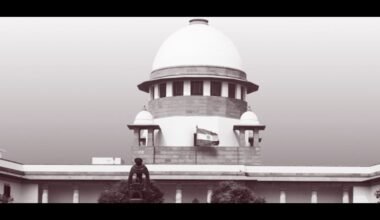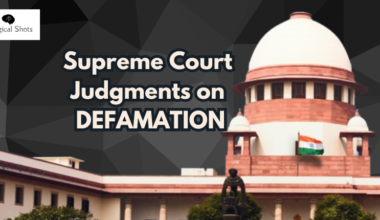Picture this – A couple got married in a beautiful ceremony. Both husband and wife clicked a lot of happy pictures, swearing their lives for each other. But things witnessed a fall when they could not love each other anymore. Frequent fights led to a situation when the wife approached the Police with a complaint of cruelty against her husband and in-laws. In the next episode, the Police come at the matrimonial home to arrest all of them. Court takes goes on and it takes a while for them to get bail. At the end, they are proved innocent and the cases are dismissed. To deal with the menace, Supreme Court judgment in Arnesh Kumar v. State of Bihar (2014) played a crucial role for arrests in matrimonial cases. The same has been summarized by our intern Adv. Aakash Poddar.
Arnesh Kumar v. State of Bihar Summary
In this case, the Supreme Court issued some directions for the Police Officers in order to arrest without warrant for offences whose punishment shall be imprisonment for a term which may be less than 7 years. The Apex Court also issued detailed directions in cases of 498-A IPC r/w section 4 of Dowry Prohibition Act, 1961.
The Supreme Court also discussed the aftermath of arrest and its consequences. The Court considered that Arrest brings humiliation and curtails the freedom of a person in the society. It is the tool of harassment in the hands of police officers. Therefore, the Court felt the need to put some speed brakers on power of arrest by Police Officers. The Apex Court’s specific focus was on the ever increasing matrimonial disputes wherein the provisions meant to work as a shield for married women being harassed at the hands of husband and his relatives, were now being used as a weapon by disgruntled wife.
In this case, the Apex Court also held that, when Police has to arrest any person, they shall also give justification on why the person should be arrested. The Court emphasized on reasoned arrest. The Court made it clear that if any Police Officer arrests without providing reasons to his/her family members, then the arrest shall not be valid. Thus, arrest should be made after conducting proper investigation, ensuring genuineness of allegations made to that person.
Arnesh Kumar Guidelines by Supreme Court
Following are the guidelines given to the Police Officers and Magistrates pertaining to power of arrest of any person:
- Arrest is mandatory in criminal cases for consideration under section 41 CrPC,1973. Arrest is not required in all cases. Thus, in similar case, Police Officers may issue a notice against that person for the appearance of the accused. Such a notice must specify the time and place for the person’s appearance.
- The State Government has the duty to give instructions to the Police Officers for arrest of the persons as per the provisions mentioned under CrPC.
- Police officers also need to provide the checklist on contents or memo of arrest of the accused persons.
- The Police Officers shall forward this list to the Magistrate furnishing the reasons for the arrests.
- Magistrate may authorize the arrest or detention of the accused person against whom allegations were made.
- The decision of arrest or not to arrest has to be made by the Magistrate within 2 weeks from the date of institution of the case. A copy has to be given to the Magistrate. The decision not to arrest be extended by the Superintendent of Police with proper reasons in writing.
- According to the section 41-A CRPC, the accused may be served with a notice of appearance within 2 weeks from the institution of the case. The time period is further extendable with the discretion of the Superintendent of Police.
Crux of Arnesh Kumar Judgment by Supreme Court
The main purpose of Supreme Court judgment in Arnesh Kumar v. State of Bihar is that the Police officers can not arrest the person unnecessarily and Magistrates must not authorize the detention of an accused person causally and mechanically. They need to provide reasons for their decision to arrest or not to arrest.








